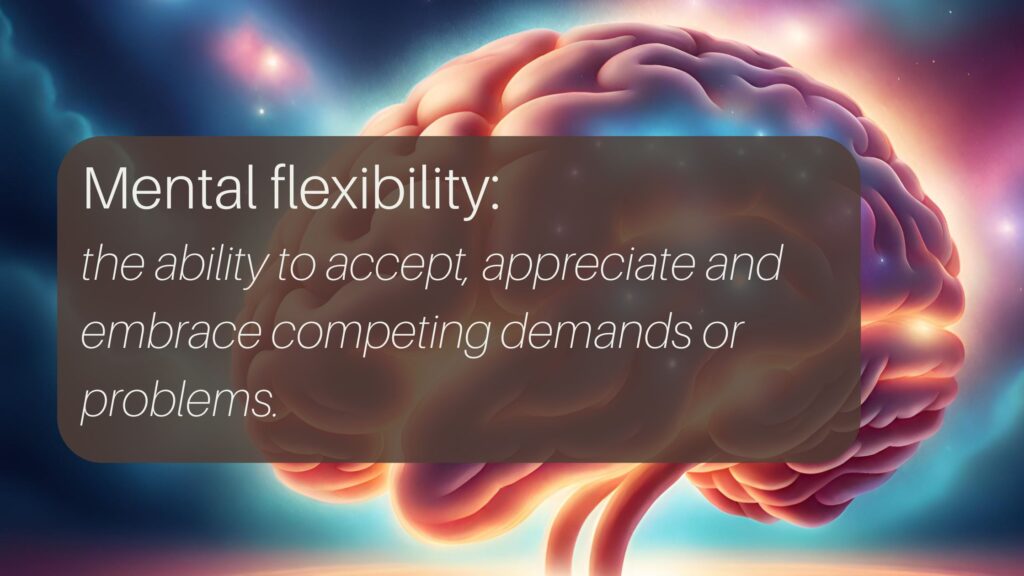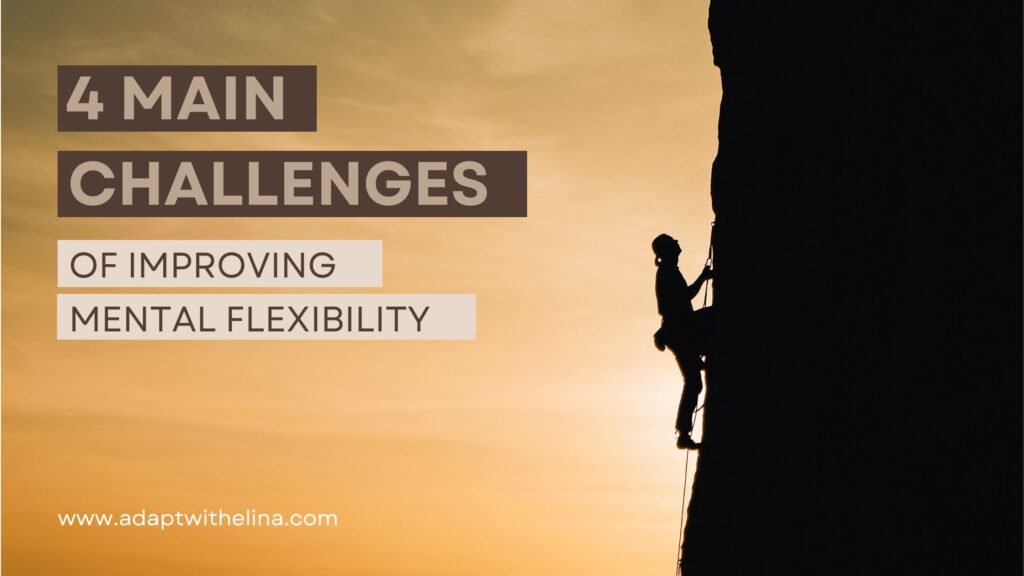Mental flexibility is one of the secret keys that can help you unlock your full potential at work. People with high mental flexibility are energised by challenges, especially complex ones, and curious, not stressed, to find the solution. That makes them more likely to solve the complex situation or a challenge they’re facing.
In this article, we will explore what mental flexibility is. I’ll share some examples of this skill and some tips and tricks on how to unlock your and your team’s full potential by using it.
Now, let’s start with the basics. What is mental flexibility?
What is mental flexibility?
Unlike rigid, or in-the-box- thinking and sticking to a single path, mental flexibility allows you to pivot, problem-solve, and innovate effectively.
Within the AQ community we call it the ability to accept, appreciate and embrace competing demands or problems.

It’s like having a toolkit of different strategies and mindsets, even opposite ones, that you can apply as needed, mixing and matching them, if necessary.
Benefits of Mental Flexibility At Work
Why do we need mental flexibility? It isn’t just a nice-to-have skill; it’s a game-changer in the workplace. As a professional or manager, you’ll find that improving mental flexibility can lead to remarkable benefits, both for you and your team. Such as:
1. Better Response to Challenges
Employees with strong mental flexibility are better equipped to handle new challenges and change at work. They make transitions smoother and have lower resistance to new ideas or processes.
2. Problem-Solving
A flexible mindset allows individuals to approach problems from various angles, leading to more creative and effective solutions. Think of it as having multiple keys to unlock complex challenges. That gives you endless opportunities to thrive where your competitors would freeze or flee.
3. Innovation
In a rapidly changing business landscape, innovation is crucial. Mental flexibility encourages out-of-the-box thinking, enabling you and the whole team to come up with fresh ideas and stay competitive. In the best practice, even proactively, before the problems even arise.
4. Stress management
If you cannot manage stress, it will take over their brain and body, limiting chances of great ideas on how to solve the new challenge. People with high levels of mental flexibility are energised by and enjoy contradictions, paradoxes and thrive on tension points between ‘clashing’ ideas. That makes them better at managing stress.
Now, mental flexibility has to be supported by the right environment, right? Because the highest skilled professional can stagnate if they don’t have the space where to express their skill.
3 Examples of this Adaptability Skill at Work

The benefits sound inspiring, but how does mental flexibilty look like at work? Let’s see 3 examples.
1. Adapting to Remote Work
Imagine that colleague – or maybe it was you! – who, when faced with a global pandemic, quickly adapted the team to a remote work setup. You accepted the challenge of remote work and experimented with ways to make it work successfully, and taught those ways to others. That’s one example of mental flexibility.
2. Immediate Fires vs. Long-Term Goals
Another example would be the need to find balance between ‘ceasing immediate fires’, and working on a bigger picture, long-term goals at work. If you nodded to this one, that’s where you need mental flexibility at your work.
3. Balancing Competing Demands at Work
The third example – is the project where you had a limited budget, but also needed to achieve high quality results and fast. In my experience, this is the mental flexibility challenge that most of us are facing at work, or will face at some point in our career or business.
These are other examples of what mental flexibility can look like in a professional setting, and it’s one of the easiest to develop in my opinion, out of all AQ, or adaptability intelligence, skills.
How to encourage mental flexibility in the workplace?
Encouraging Mental Flexibility in the Workplace
Fostering a culture of mental flexibility in your workplace is key to reaping its benefits, so to speak. Here are some strategies to encourage mental flexibility in the workplace:
1. Lead by Example
Leaders need to demonstrate mental flexibility in their decision-making and problem-solving processes. A team is more likely to follow the leader when they see it in action. Or, in other words – lip service does not work.
2. Reward Adaptability
Team members who exhibit mental flexibility should be acknowledged and celebrated, whether through formal recognition programs or simple praise during team meetings. Remember the good old golden rule – praise publicly, criticise privately, and you’re good to go.
3. Encourage Continuous Learning
Employees should be encouraged to explore new skills and perspectives. It can happen through workshops, courses, or even reading. Create a book club if it works for your team. A great idea is to organise adaptability skill training, so the team is better prepared for new challenges ahead. Make sure they have a time and place to share their new knowledge with others.
4. Embrace Failure as a Learning Opportunity
Encourage your team to view setbacks as opportunities for growth.
Share stories of famous failures that ultimately led to success, but not Thomas Edison’s numerous attempts before inventing the light bulb. That everyone has already heard, and they’ll not listen. Search for something else.
5. Foster Open Communication
Create an environment where employees feel safe sharing their ideas and concerns. This open dialogue encourages different viewpoints and promotes mental flexibility.
These are some ideas. Feel free to contact me for more, if you need support in the process.
Now, for those who like to prepare.
What are the challenges that prevent you from improving mental flexibility?
Challenges of improving mental flexibility

Developing mental flexibility is not without its challenges. However, with determination and the right approach, your teams can overcome them.
Here are 4 most common obstacles and ways to address them:
1. Resistance to Change
Some employees may resist adopting a more flexible approach. Good strategies to solve it are praising those who improve their mental flexibility, providing training to ease the transition, and understanding the overall stress level of your employee. As I said before, when stress levels are too high, the brain blocks new ideas and information. So, if the stress levels are too high at work, as silly as it sounds, a vacation may be the best way to get the team on board with mental flexibility.
2. Fear of Failure
Employees may be hesitant to embrace new approaches for fear of making mistakes. They might not communicate mistakes, that may lead to even bigger problems, or slower growth.
So, if you’re a leader, you have to observe and understand, if this is the person’s set of skills, their character traits, the work environment, or a mix of them all, that creates the fear.
‘Keep in mind that people can have fear of failure even in so-called “positive and encouraging environments”. Because they simply don’t want to be the ones who spoil the party’.
Trust me, I’ve been in this situation.
3. High Stress Levels
The best ideas come to us in the shower, during a walk or while getting asleep. We often laugh about it – haha, it is so – but pay attention! The mind is relaxed and wandering in all of these situations. The best ideas come when we are relaxed.
Then why do we try to squeeze new ideas out of us when life shows us the opposite is true?
There have been a couple of cases now when I tell my clients to make rest their priority. Just like in the Parks and Recreation episode where Leslie, the main character, got her brainstorming skills back simply after a good night’s sleep, you’ll be surprised how rest can work better than working hard with mental flexibility.
I have experienced it, my clients have experienced it – just try! Maybe it works for you too.
4. Lack of Resources
As Gallup had researched, the most successful teams are made of people that feel they have the resources necessary to do their everyday job (It’s just one of the criteria for the most successful teams, but really important and often forgotten).
Ensure your teams have access to the necessary resources, including training programs or mentors, to support their journey towards greater mental flexibility.
Let’s see an example.
There was an organisation that I had the luck to work with. It was the first time in my career where I worked with a company that grew immensely fast.
At first, it was energising – everybody likes to be on the winning team.
Then, a couple of months later, the speed of their growth started to bite the company. There was a huge chaos, everyone I talked to said the workload was too high. New team members joined every week and the managers were on the edge of burnout.
Turnover rates spiked! Many people got fired quickly after hiring or left. That made the rest of employees cautious and unmotivated – will I be the next to be fired? Should I leave too? What’s happening?
The productivity fell, and the company started to stagnate. Now, this is NOT a great environment of innovation and growth.
So, what did the CEO and managers do to fix this? Basically, all the 4 things I mentioned before.
At first, they hired people who would handle the missing pieces or workload. They provided training to the team. Allowed the ones on the edge of burnout to have a vacation. What’s even better – they introduced mandatory vacation! And the CEO openly praised the ones who admitted the mistakes and had made the decisions to fix them.
So, turnover rates dropped, people got more motivated and showed higher openness to the changes that followed, and even proactively suggested solutions for problems they faced. The company got back on the right track.
But… How to know if you’re on the right track of improving mental flexibility in your team or organisation?
How can you improve mental flexibility?
Can you improve mental flexibility? Short answer – yes, if you do the work. I’ll share a couple of examples how it may look like.
1. Improving Mental Flexibility of an HR Leader
An HR leader that had logical thinking and analysis as her strengths, reached out to me for AQ skills training. The AQ assessment showed that mental flexibility indeed was a skill she could improve, so I created a training program for her to improve it.
After 8 weeks she reported noticeable changes in her stress levels, mental flexibility and overall wellbeing at work, although nothing else had changed in her life or work. Even people around her noticed changes – these were clear signs she had improved.
2. Integrating Existing Skills to the Work Setting
Another client of mine, a leader in a health organisation, learned that her mental flexibility level was actually quite high, according to AQ assessment results. That made her realise that, yes, she uses the skill with her family and friends, it just does not transfer to her work life yet.
So we had to work on ways she could integrate mental flexibility skills she already had in her professional life.
She wrote to me after 4 weeks, happy about how she acted flexibly in a stressful situation at work where she used to freeze and deny others’ spontaneous ideas. That led her to improve relationships with one particular colleague.
Another way to see that the training was going in the right direction.
3. Seeing Opportunities Instead of Freezing From Stress
Last, but not least, the most recent case. I trained a group of 7 people, and at the beginning of the third adaptability skill training session 4 of 7 people reported this. During some situations at work where they’d usually freeze, not knowing what to do, it was easier to find an idea on how to move on. One woman even said that she had started to see multiple ideas at once – something she had never experienced in that particular situation.
Keep in mind that the results can differ according to many reasons, for example, your existing stress levels, the work you put in the training.
But these were 3 examples on how the improvement of your mental flexibility can look like. So, again – yes, it is possible to improve your mental flexibility.
If this is something you want – contact me for 1:1 online training, and let’s unlock your mind’s potential!
To wrap it up –
Remember all the examples from this blog? These stories are just few examples of what can be achieved when mental flexibility is nurtured, mesured and trained, if necessary.
By understanding, training, and measuring mental flexibility, you can empower yourself of your teams to overcome challenges, innovate, and excel in their roles.
If you do want to have a skilled trainer who helps you tangibly boost your (or team’s) mental flexibility, contact me here or let’s connect on LinkedIn.

Comments are closed